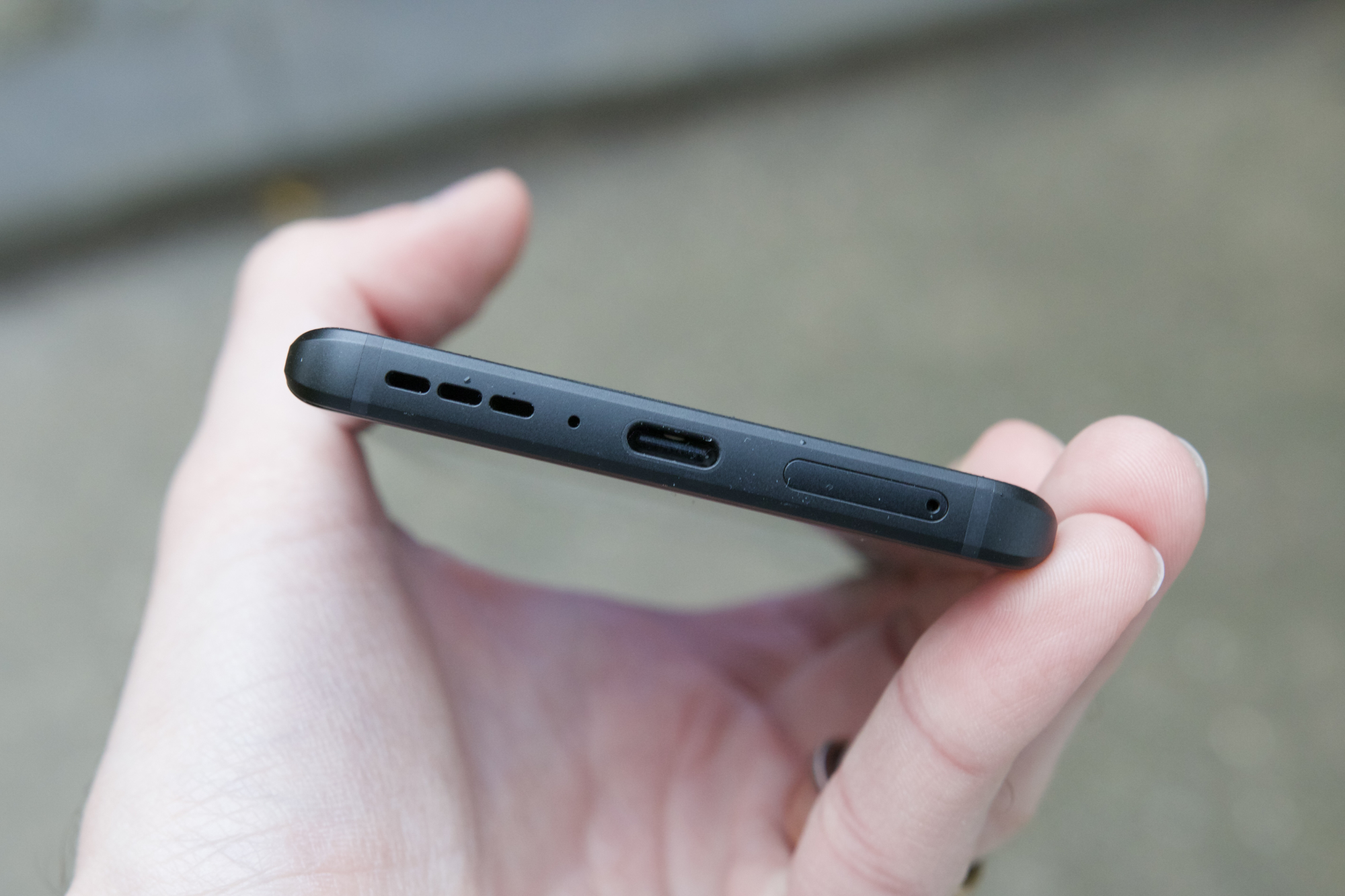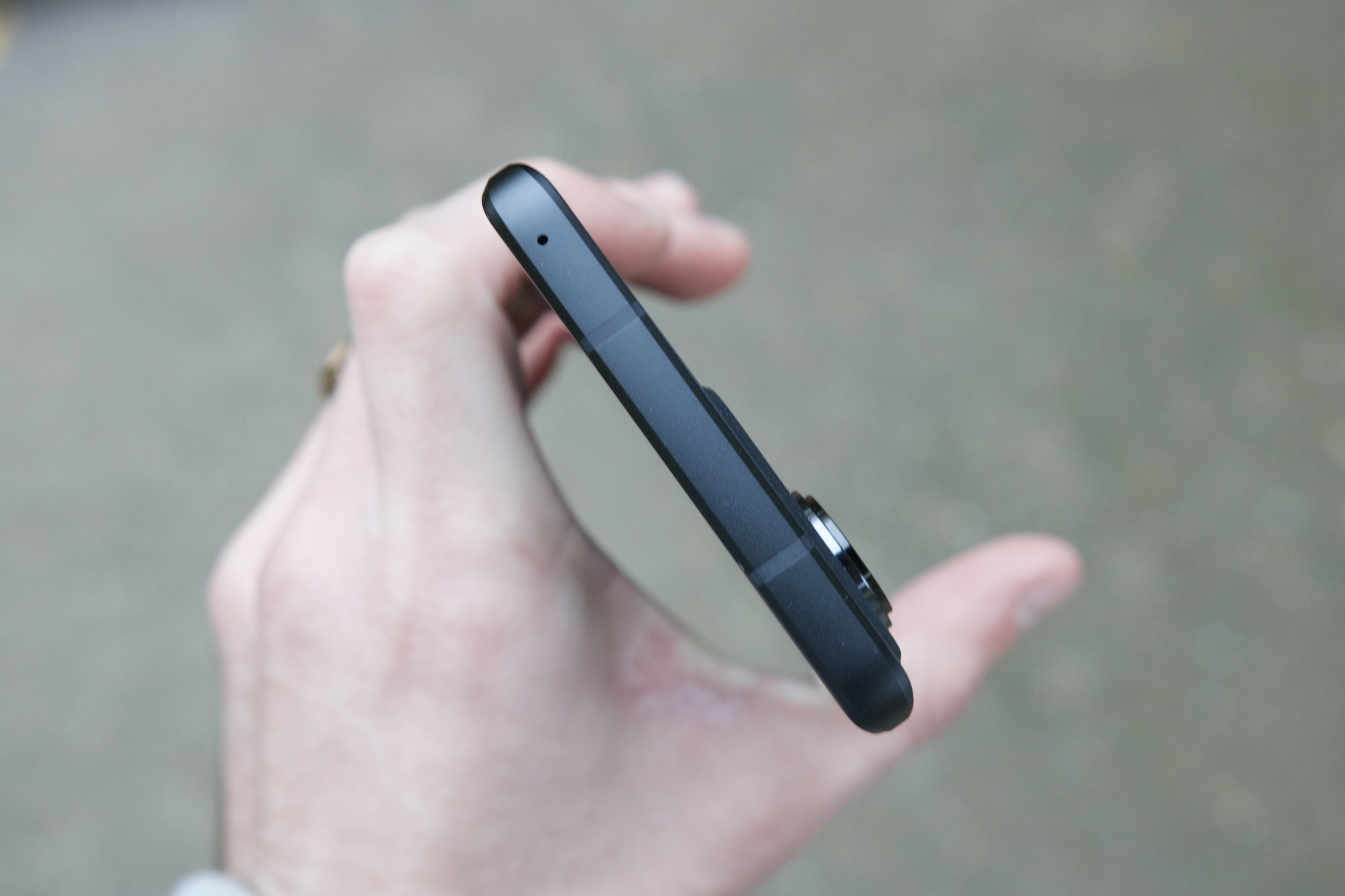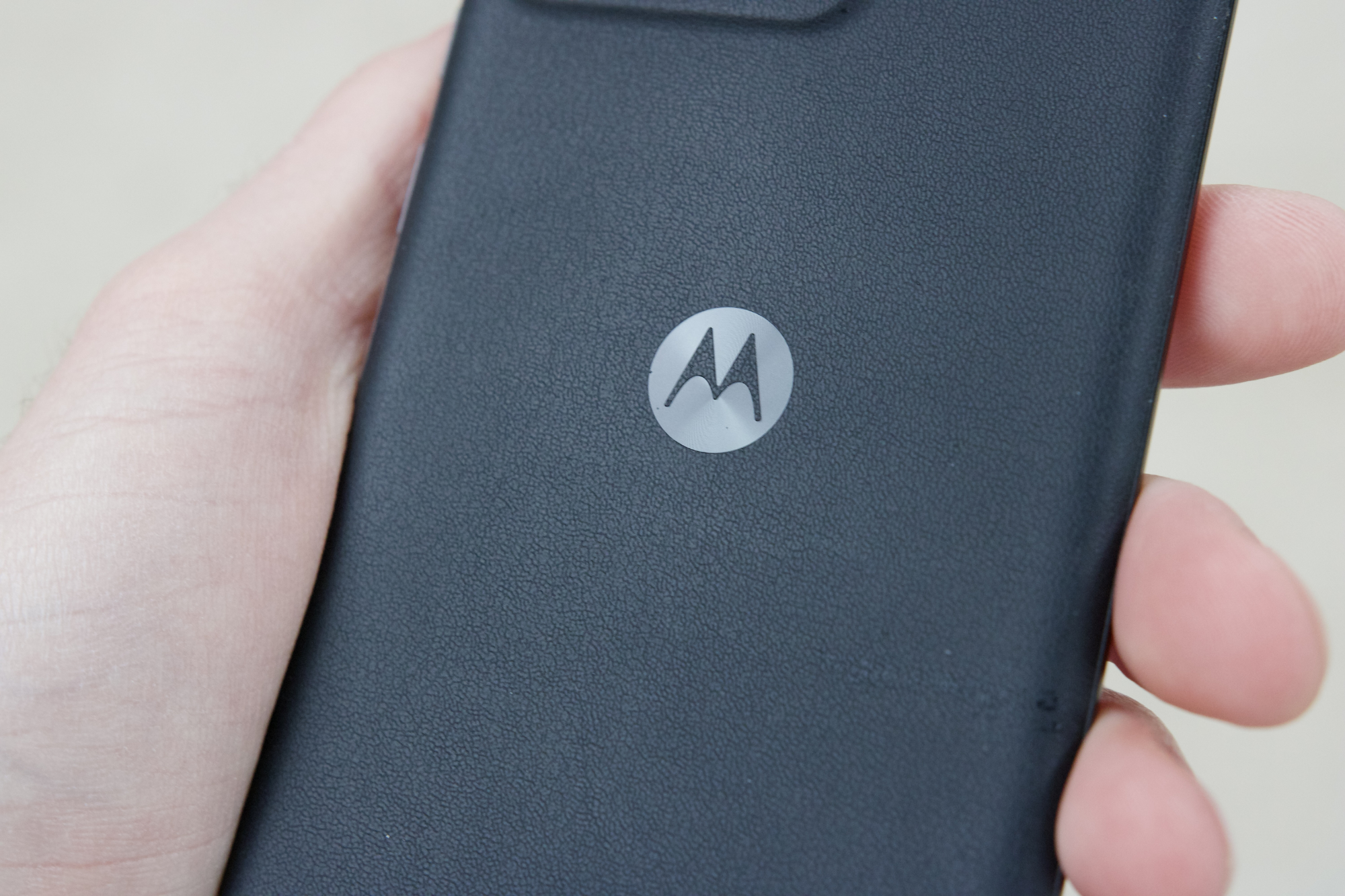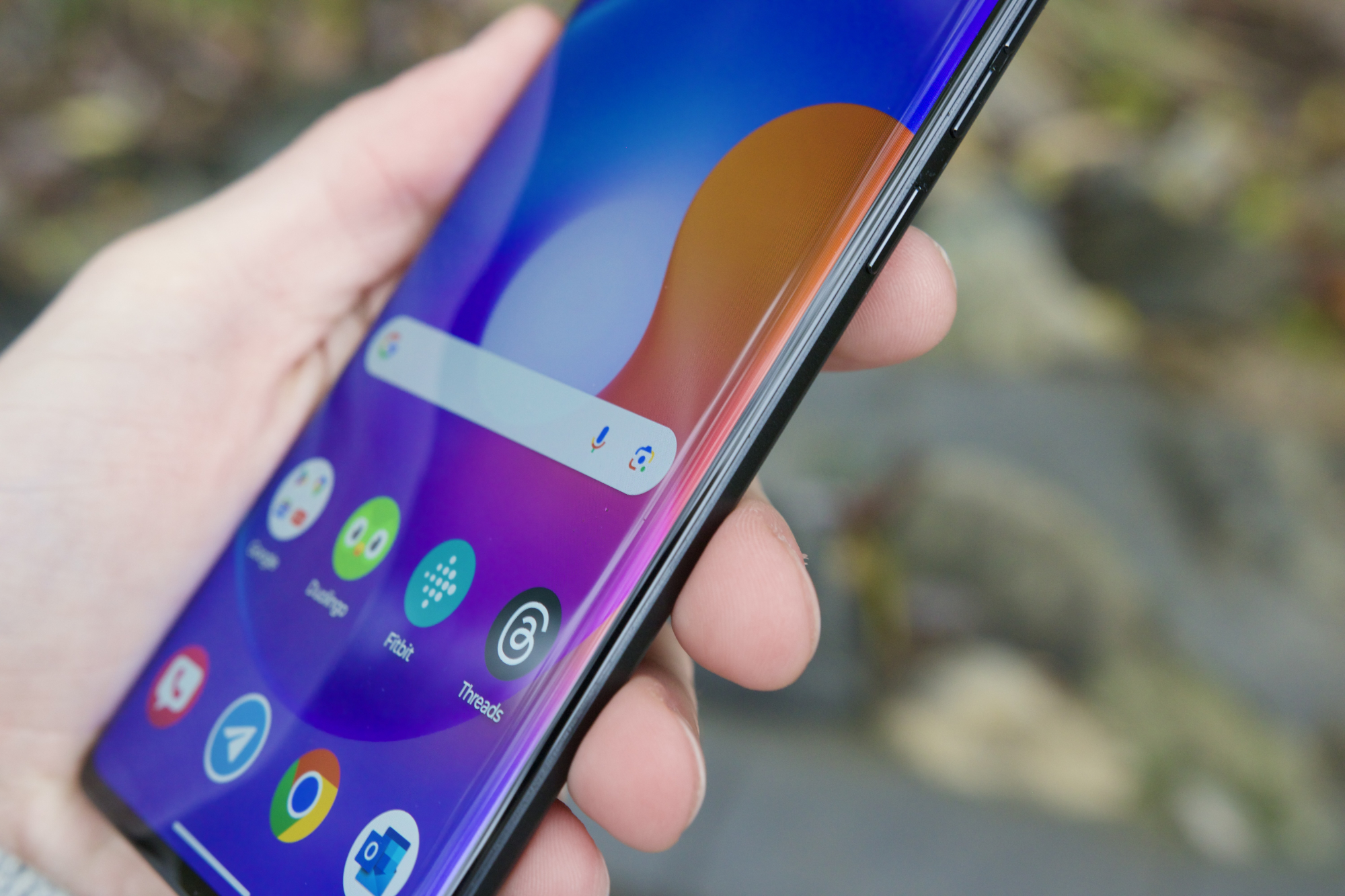Motorola Edge (2023)
MSRP $600.00
“The Motorola Edge (2023) came out of nowhere, and it’s a surprisingly good Android phone — and a great value.”
Pros
- Unique leather back
- Gorgeous curved display
- Solid day-to-day performance
- Good battery life
- 68-watt wired charging
Cons
- Slow cameras
- In-screen fingerprint sensor
- Only gets two software updates
If you have $700 to spend and need a new smartphone, one of the best options you can find today is the Google Pixel 8. Google’s newest Pixel handset has a great design, excellent cameras, fantastic software, and surprisingly good battery life. It’s just a pleasure to use in almost every regard.
But Motorola’s latest phone makes things interesting for prospective Pixel 8 buyers. On October 10, just days after Google revealed the Pixel 8 and Pixel 8 Pro, Motorola announced a new Android phone of its own — the Motorola Edge (2023). It promises good design, cameras, software, and battery life, all for $100 less than the Pixel 8.
Is it all too good to be true? Is the Motorola Edge (2023) the Google Pixel 8 killer we didn’t know we needed? I used Motorola’s new phone to find out for myself, and I must admit that I’m impressed … mostly.
What I love about the Motorola Edge (2023)

The Motorola Edge (2023) makes an excellent first impression the second you take it out of the box. The matte aluminum frame is sleek and cool to the touch, and the screen curves over the left and right edges — making it look like there aren’t any bezels at all. I don’t have particularly strong feelings about flat versus curved displays, but the curves on the Motorola Edge add a touch of elegance that’s unexpected at this price.
I also quite like the back of the Motorola Edge (2023). Motorola chose vegan leather for the rear of the phone, and it feels excellent. It’s grippy, has a pleasant texture, and looks leagues better than the glossy plastic backs seen on other budget Android phones (I’m looking at you, OnePlus Nord N30 5G). I wish Motorola offered more than the single Eclipse Black color, but overall, I have very little to criticize about this design.
Beyond the curved display and leather back, Motorola also got the smaller details right. The power and volume buttons feel nice, the speakers sound good (and get very loud), and there’s an IP68 rating for dust and water resistance — the same one you get on flagship smartphones like the Samsung Galaxy S23 Ultra and iPhone 15 Pro Max.
Speaking of the display, it’s excellent. Besides the curved edges, the 6.6-inch screen offers a pOLED panel with a 2400 x 1080 resolution, HDR10+ support, up to 1,200 nits of peak brightness, and a 144Hz refresh rate. It’s a fantastic screen with vibrant colors and plenty of brightness for regular use. You can force the refresh rate to run at 144Hz, but I’ve kept it in Auto mode — which runs it at up to 120Hz — and it’s looked great to my eyes. When Apple is still slapping 60Hz displays on its iPhone 15 and iPhone 15 Plus, having 144Hz on the Motorola Edge (2023) feels pretty awesome.

I’ve also been (mostly) impressed by the Motorola Edge’s performance. Powering the phone is a MediaTek Dimensity 7030 chipset. It’s one of the only phones in the world with this specific MediaTek chip, and it’s actually pretty good. Apps open quickly, the 8GB of RAM has done a great job with basic multitasking, and the Edge (2023) has held its own with various mobile games.
Having 144Hz on the Motorola Edge (2023) feels pretty awesome.
With graphics quality set to High and 60 frames per second (fps) enabled, Marvel Snap looks and runs great. Motorola’s phone also does a good job of playing Call of Duty: Mobile with High graphics and Max frame rate settings. Some menus take slightly longer to load compared to phones with a Snapdragon 8 Gen 2 chip, but it’s never been enough to seriously impact my enjoyment of the phone.
Lastly, I’d be remiss if I didn’t talk about battery life and charging. It’s a 4,400 mAh battery inside the Motorola Edge (2023), and in my testing, it’s typically enough to get me through a day and a half on a single charge. You can drain the battery in a single day if you really try, but with moderate app usage and some light gaming, a day and a half is much more likely.

And when your battery does run dry, the Motorola Edge (2023) is able to charge up quickly thanks to 68-watt wired charging. Plug the phone in with a fully depleted battery, and you’re back up to 17% after just 10 minutes of charging. Thirty minutes on the charger takes you from zero to 52%, while getting all the way to 100% happens in about 55 minutes.
If you don’t mind sacrificing charge speed, you can also wirelessly charge the Edge (2023) at up to 15W. And if you want to top up another phone or a pair of wireless earbuds, you can place them on the back of the Motorola phone to use its 5W wireless power sharing. This is one of the better charging solutions on a smartphone at this price, and it’s a seriously huge benefit if you pick up the Motorola Edge (2023).
Where Motorola stumbles

Motorola got a lot right with the Edge (2023), but as with any phone, perfect it is not. In fact, there are a few big issues with the Motorola Edge.
The first has to do with the phone’s cameras. The Motorola Edge (2023) has two cameras on the back, including a 50MP main camera and a 13MP ultrawide camera. There’s also a 32MP selfie camera.
In good lighting conditions and with a steady hand, photos from the Motorola Edge (2023) can look fine. They typically look a bit flat without particularly impressive colors or details, but they’re certainly usable for posting on social media or sharing with friends.
These certainly aren’t the best photos I’ve taken with a smartphone this year, but they get the job done. The ultrawide camera is a bit worse than the main sensor, but if you need a wider view of your subject, it works.

My main issue with the camera is how slow it is. Throughout my time with the Motorola Edge (2023), the actual photo-taking process hasn’t been an enjoyable one. The camera app can be slow to open, the shutter button has a noticeable pause between pressing it and when your photo is captured, and this often results in blurry or missed shots.
I’m not sure if the MediaTek processor is to blame or if this is poor optimization on Motorola’s part. Whatever the cause is, all I know is that it’s made taking pictures with the Motorola Edge (2023) pretty frustrating at times.
Speaking of slow, the phone’s in-screen fingerprint sensor isn’t always as quick as I’d like. It usually works, but there have been a few instances where it takes too long to scan my fingerprint or fails to identify it entirely. I’ve also noticed some instances where tapping notifications or swiping down to view my Quick Settings causes the phone to stutter a bit. It seems to happen more often if I try to do something on the phone very quickly after I pick it up — it’s almost like it takes it a second to “warm up” and start working as intended.

Finally, there’s the issue of software updates. The Motorola Edge (2023) ships with Android 13 and is promised just two Android OS upgrades — plus three years of bimonthly security patches. This isn’t the worst update policy we’ve ever seen on a Motorola phone, but it’s not good, either.
It especially stings considering that Android 14 has now been available since early October. After Motorola gets the Edge (2023) updated to Android 14, the only other big OS update you’ll ever see is to Android 15. Motorola has been getting better with how it updates its phones — most recently with the Motorola Edge Plus (2023) and Motorola Razr (2023) — but this is a disappointing step backward.
How it compares to the Google Pixel 8

On its own, the Motorola Edge (2023) is a darn good smartphone. But the Motorola Edge doesn’t exist on its own. It was released right alongside the Google Pixel 8, and with a similar price, so it’s impossible not to compare the two. And it’s here where the pitch for Motorola’s phone starts to weaken.
Perhaps the biggest differentiator is the camera. The Google Pixel 8 takes much better photos than the Motorola Edge (2023). The 50MP main camera and 12MP ultrawide camera don’t sound much different on paper, but in practice, the gap between the two is clear. Google’s camera app is also much faster and more reliable, and there’s a whole world of AI photo-editing tools that crank it up to 11.
Google also has Motorola handily beat on the software front. Although the Android interfaces look largely the same on both phones, the Pixel 8 gives you so much more. From the Google Assistant holding your spot in line on a phone call, Now Playing automatically recognizing music playing in the background, or being able to summarize entire webpages into a few bullet points, the AI features you get on a Pixel are pretty incredible — and are legitimately difficult to live without on a non-Pixel Android phone.
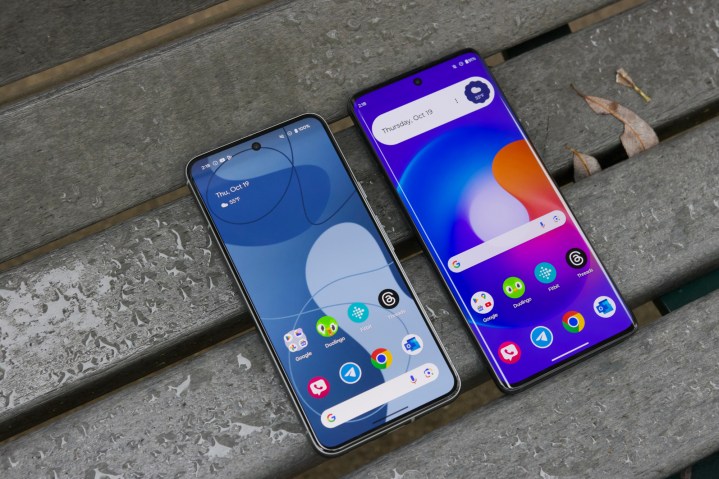
There’s also the matter of software updates. The Google Pixel 8 ships with Android 14 and is promised seven years of Android upgrades, feature drops, and security patches. In other words, the Pixel 8 will keep getting software updates through October 2030 — four years after the Motorola Edge (2023) receives its last security patch.
And then we have everything else. While the Motorola Edge (2023) has very nice hardware, the Google Pixel 8 edges it out. It has a much nicer vibration motor, the buttons feel clickier, and its extra weight (187 grams versus 168 grams) feels reassuring in your hand. You’ll also find that the Google Pixel 8’s Tensor G3 processor is more capable than the MediaTek chip in the Motorola Edge. The Pixel 8 generally feels smoother throughout daily use, and it also has much faster internal storage — UFS 3.1 compared to the UFS 2.2 storage Motorola opted for.
The Pixel 8 can’t match the Motorola phone when it comes to charging speed, and the Edge (2023) has a larger display, but those are really the only two areas where Motorola has a clear advantage.
Motorola Edge (2023) price and availability
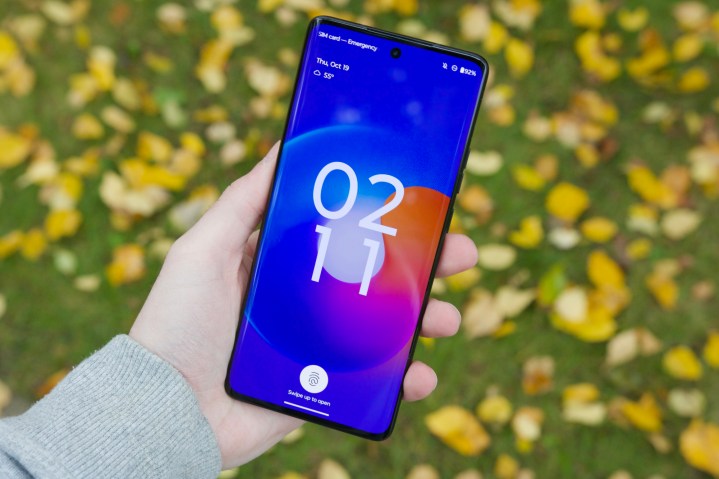
The Motorola Edge (2023) is available for purchase right now from Motorola’s website, Amazon, Best Buy, and other retailers. It comes in just one configuration — the Eclipse Black color with 256GB of storage and 8GB of RAM.
You’ll find a retail price of $600 for the Motorola Edge (2023), which is $100 less than the $700 Google Pixel 8 and $200 cheaper than the $800 Samsung Galaxy S23. That’s already a good deal, but things get more interesting.
As part of a special launch offer, you can buy the Motorola Edge (2023) right now for just $500. It’s technically a limited-time promotion, but knowing how Motorola runs its sales, you should be able to get the Edge (2023) at this $500 sale price fairly often.
Should you buy the Motorola Edge (2023)?
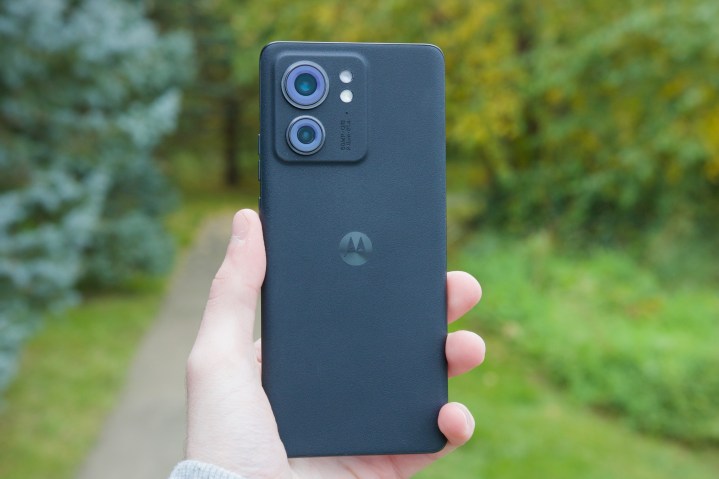
OK — so what’s the final word on the Motorola Edge (2023)? Did Motorola knock it out of the park and create a phone you should buy instead of the Google Pixel 8? As with everything in life, it’s a bit complicated.
If you can buy the Motorola Edge at its discounted $500 price, I think there’s a really solid argument in the phone’s favor. At $200 cheaper than the Pixel 8, the Edge (2023) delivers a really solid smartphone experience — so long as you don’t mind some occasional performance issues and a lackluster camera. But if we’re looking at the Motorola Edge (2023) as a $600 smartphone, I don’t think the $100 in savings is enough to justify buying it over the Pixel 8.
The Edge (2023) delivers a really solid smartphone experience.
For folks who can afford it, there’s no denying that the Google Pixel 8 is the better overall choice. In fact, it’s one of the very best smartphones you can get right now. But if money is an object — and you can snag the Edge (2023) at its lower price — it’s worth considering. It may not be the undisputed Google Pixel 8 killer that Motorola hoped it would be, but it is a worthy alternative — and a phone that should be on your radar.
Editors’ Recommendations

